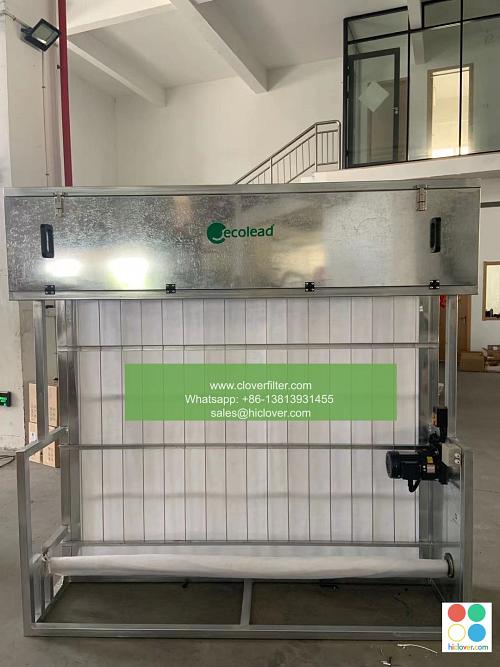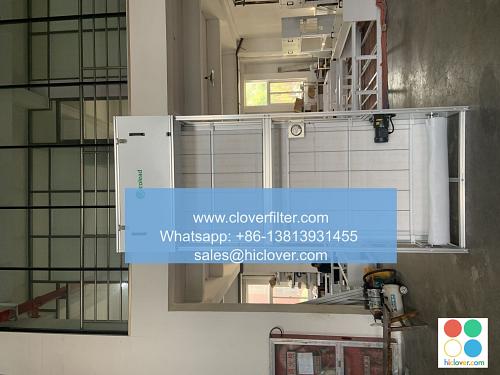The Benefits of Automatic Roll Air Filters in Red Deer’s Oil and Gas Industry: An Overview

The oil and gas industry in Red Deer, Alberta, is a significant sector that drives the local economy. As with any industrial setting, maintaining a clean and efficient work environment is crucial for productivity and safety. One often overlooked aspect of industrial maintenance is air filtration. In this context, automatic roll air filters have emerged as a game-changer, offering numerous benefits that enhance the overall performance of oil and gas operations. This article aims to provide an overview of these benefits and explore how automatic roll air filters can be a valuable addition to the industry.
Traditional air filtration systems often require manual intervention, which can be time-consuming and prone to human error. In contrast, automatic roll air filters operate with minimal supervision, automatically replacing the filter media as needed. This automation not only saves labor costs but also ensures consistent air quality, reducing the risk of downtime due to poor air filtration. Moreover, the continuous operation of these filters means that the air quality remains stable, providing a healthier working environment for employees and reducing the risk of equipment damage from airborne contaminants.
The oil and gas industry is known for its complex and often harsh environments, with equipment and machinery generating significant amounts of dust, debris, and other airborne pollutants. Automatic roll air filters are designed to handle these challenging conditions, capturing a high percentage of particles and contaminants. By maintaining clean air, these filters help in preserving the longevity of equipment and machinery, reducing maintenance costs, and minimizing the risk of premature wear and tear. This, in turn, leads to increased operational efficiency and reduced downtime for repairs and maintenance.
Another critical aspect of the oil and gas industry is compliance with environmental and safety regulations. Automatic roll air filters can play a significant role in helping operations meet these standards. By effectively removing particulate matter and other contaminants from the air, these filters contribute to a cleaner environment, both within the facility and in the surrounding areas. This not only helps in avoiding potential fines and legal issues but also enhances the company’s reputation and commitment to environmental sustainability and worker safety.
In addition to the operational and environmental benefits, automatic roll air filters also offer a cost-effective solution for air filtration needs. While the initial investment in these systems might seem higher compared to traditional filters, the long-term savings and benefits far outweigh the costs. Reduced labor for filter maintenance, less frequent replacement of filter media, and extended lifespan of equipment are just a few ways these filters can lead to significant cost savings over time. Furthermore, the energy efficiency of these systems, achieved through optimal air flow and reduced pressure drop, can also contribute to lower energy bills, making them a financially prudent choice for oil and gas operations.
Implementing automatic roll air filters in the oil and gas industry of Red Deer can also have broader implications for the community and the environment. By adopting more efficient and cleaner technologies, local industries can contribute to improving air quality, reducing pollution, and promoting a healthier environment for residents. This proactive approach to environmental stewardship can foster positive relationships between industrial operators and the local community, paving the way for sustainable development and growth.
In conclusion, automatic roll air filters offer a multitude of benefits for the oil and gas industry in Red Deer, from enhanced operational efficiency and cost savings to improved environmental compliance and worker safety. As the industry continues to evolve, embracing innovative solutions like automatic roll air filters will be key to maintaining competitiveness, reducing environmental impact, and ensuring a sustainable future for operations. Whether you’re looking to upgrade your existing air filtration system or seeking to implement new technologies to drive efficiency and compliance, considering the advantages of automatic roll air filters is a step in the right direction.
FAQs
- What are automatic roll air filters? Automatic roll air filters are advanced air filtration systems designed to automatically replace the filter media as needed, ensuring continuous and efficient air purification with minimal manual intervention.
- How do automatic roll air filters benefit the oil and gas industry? These filters enhance operational efficiency, reduce maintenance costs, improve environmental compliance, and contribute to a safer and healthier work environment.
- Are automatic roll air filters cost-effective? Yes, despite a potentially higher initial investment, automatic roll air filters lead to long-term savings through reduced labor costs, less frequent filter replacements, and extended equipment lifespan.
- Can automatic roll air filters help with environmental compliance? Yes, by effectively capturing airborne contaminants, these filters help operations meet environmental standards, contributing to a cleaner environment and avoiding potential legal issues.
- How do automatic roll air filters impact the local community and environment? By promoting cleaner technologies and reducing pollution, the adoption of automatic roll air filters can lead to improved air quality, fostering a healthier environment for both the industry and the local community.


